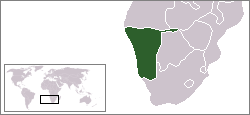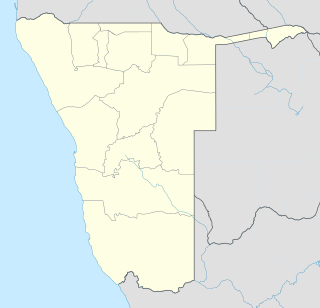
The South West Africa People’s Organisation (SWAPO), officially known as SWAPO Party of Namibia, is a political party and former independence movement in Namibia. It has been the governing party in Namibia since the country achieved independence in 1990. The party continues to be dominated in number and influence by the Ovambo ethnic group.

Samuel Shafiishuna Daniel Nujoma, is a Namibian revolutionary, anti-apartheid activist and politician who served three terms as the first President of Namibia, from 1990 to 2005. Nujoma was a founding member and the first president of the South West Africa People's Organization (SWAPO) in 1960. Prior to 1960, SWAPO was known as the Ovambo People's Organisation (OPO). He played an important role as leader of the national liberation movement in campaigning for Namibia's political independence from South African rule. He established the People's Liberation Army of Namibia (PLAN) in 1962 and launched a guerrilla war against the apartheid government of South Africa in August 1966 at Omungulugwombashe, beginning after the United Nations withdrew the mandate for South Africa to govern the territory. Nujoma led SWAPO during the lengthy Namibian War of Independence, which lasted from 1966 to 1989.
Lozi, also known as siLozi and Rozi, is a Bantu language of the Niger–Congo language family within the Sotho–Tswana branch of Zone S (S.30), that is spoken by the Lozi people, primarily in southwestern Zambia and in surrounding countries. This language is most closely related to Northern Sotho, Tswana (Setswana), Kgalagari (SheKgalagari) and Sotho. Lozi and its dialects are spoken and understood by approximately six percent of the population of Zambia. Silozi is the endonym as defined by the United Nations. Lozi is the exonym.
Herman Andimba Toivo ya Toivo was a Namibian anti-apartheid activist, politician and political prisoner. Ya Toivo was active in the pre-independence movement, and is one of the co-founders of the South West African People's Organisation (SWAPO) in 1960, and its predecessor the Ovamboland People's Organization (OPO) in 1959.
The Ovamboland People's Organization was a nationalist organization that existed between 1959 and 1960 in South West Africa. The aim of the organization was to end the South African colonial administration, and the placement of South West Africa under the United Nations Trusteeship system. Andimba Toivo ya Toivo had founded its predecessor, the Ovamboland People's Congress, in 1957 in Cape Town, South Africa. In 1959, Sam Nujoma and Jacob Kuhangua established the Ovamboland People's Organization (OPO) at the Old Location in Windhoek. Sam Nujoma was the president of OPO until its transformation into the South West Africa People's Organization (SWAPO) a year later and remained president until Namibia gained independence in 1990.

Lesbian, gay, bisexual, and transgender (LGBT) persons in Namibia face legal challenges not experienced by non-LGBT residents. Discrimination based on sexual orientation and gender identity is not banned in Namibia. Households headed by same-sex couples are not eligible for the same legal protections available to opposite-sex couples. However, despite the lack of legal rights experienced by Namibian LGBT citizens, acceptance and tolerance of the LGBT population is reportedly as high as 55%.

A presidential and parliamentary election was held on 27–28 November 2009 in Namibia. It was the fourth general election since independence and the fifth democratic election. Voting ended on 28 November and official election results, released on 4 December, showed that Hifikepunye Pohamba and his SWAPO Party were re-elected, each with over 75% of the vote. Prior to the election, the South West Africa People's Organization (SWAPO) was widely expected to score a landslide victory, with the Rally for Democracy and Progress (RDP) considered SWAPO's biggest challenger. Fourteen political parties competed for seats in the National Assembly of Namibia, and twelve candidates ran for the Presidency.
The National Society for Human Rights (NSHR) is a Saudi Arabian human rights organisation closely associated with and funded by the Saudi government. It was established on 10 March 2004, two years after the Human Rights First Society applied unsuccessfully for a licence. As of August 2018, the President of the NSHR was Mufleh bin Rabayan al-Qahtani.
The Halloween massacre refers to events which took place from October 30 to November 1, 1992 in Luanda, Angola as part of the Angolan Civil War.
Jeremia Nambinga is a Namibian politician. Since 2008, Nambinga has been a member of the Rally for Democracy and Progress (RDP) and has been its president from 2015 to 2018. A long-serving member of Swapo party, Nambinga was Deputy Minister of Home Affairs and a member of the National Assembly of Namibia from 1995. In 2000 he was transferred to the Ministry of Prisons and Correctional Services where he served as Deputy Minister until 2004. For the following election period he almost missed his place in the National Assembly, being #56 on the SWAPO's party list with 55 seats won. He re-entered as backbencher when Philemon Malima retired soon after the election.

Okahao is a town in the Omusati Region of northern Namibia and the district capital of the Okahao electoral constituency. It is situated in the Ongandjera tribal area 73 kilometres (45 mi) west of Oshakati on the main road MR123.
Anton von Wietersheim is a Namibian politician. Wietersheim was a member of the Constituent Assembly of Namibia from 1989 to 1990 and was elected to the National Assembly as a SWAPO candidate in 1990. He served as Minister of Agriculture before resigning in 1993.
The Caprivi Vision is bi- monthly published community newspaper in Namibia with content in English and siLozi. It is sold in the Caprivi Strip, Northern Regions of Namibia, in the capital Windhoek and other countries of the Southern Africa such as Botswana and Zambia. The Caprivi Vision was founded by Risco Lumamezi on 21 August 2000 as a student of the Polytechnic of Namibia, and its first edition hit the streets on 30 April 2002. Its current editor-in-chief is Risco Lumamezi.
Angura Peter Tshirumbu Tsheehama (1941–2010) was a commander in the People's Liberation Army of Namibia, diplomat, Chief of Intelligence, and Namibian minister.
Helao Nafidi Ya France is a Namibian cricketer. He is known by his nickname Picky. Ya France is a left-handed batsman who bowls right-arm slow. He was born in Windhoek, Khomas Region.
Dr. James Suzman is an anthropologist and the author of Affluence Without Abundance: The disappearing world of the Bushmen published by Bloomsbury in 2017. He is the nephew of Janet Suzman and great-nephew of Helen Suzman. He is based in Cambridge, UK.
The Rainbow Project (TRP) was a non-governmental organisation advocating for LGBT rights and acceptance in Namibia. It provided resources to marginalised communities and worked to counter homophobia and discrimination against sexual minorities in the Namibian community. At its inception, TRP was the only organisation of its kind to focus on injustice against and abuse of sexual minorities in the country; this contrasted with other prominent Namibian LGBT organisations, such as Sister Namibia, which primarily supported lesbians.

Human rights in Namibia are currently recognised and protected by the Namibian constitution formed in 1990 by a 72-seat assembly. The assembly consisted of differing political parties. After a draft, the constitution was agreed upon by all members of the seven political parties involved. 21 March 1990 marks the first day Namibia operated under the Constitution and also marks the recognition of Namibia as an independent nation. Chapter 3 of the constitution entitled Fundamental Human Rights and Freedoms, also referred to as the Bill of Rights, outlines the human rights of all Namibian citizens.





